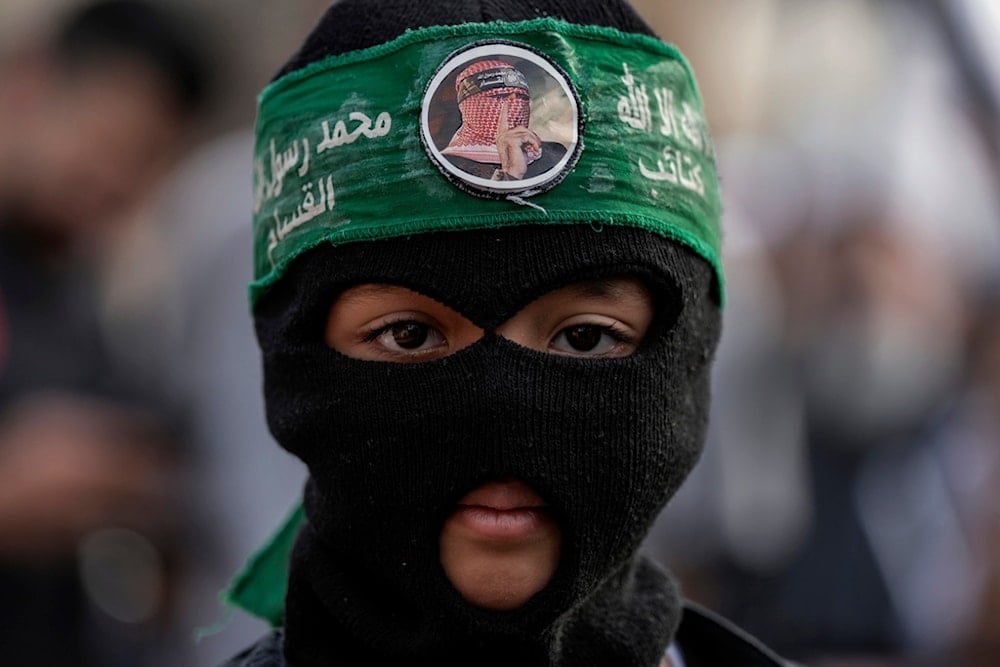Israeli report admits Hamas resilience despite ongoing assault on Gaza
Israeli analyst Amir Bohbot reports that after 600 days of war, Hamas remains firmly entrenched, rebuilding its ranks and retaining popular support despite devastating Israeli attacks, while cracks appear in "Israel's" military strategy, morale, and internal cohesion.
-

A Palestinian boy wears a mask with a picture of Abu Obeida, the spokesman for the Qassam Brigades, the Hamas' military wing, during a protest to condemn "Israel's" war on Gaza, on Beirut's corniche, Lebanon, Monday, April 7, 2025 (AP Photo/Bilal Hussein)
Israeli military affairs analyst Amir Bohbot, writing for the Israeli news site Walla! on Wednesday, acknowledged that Hamas remains resilient and continues to rebuild its capabilities, even after 600 days of relentless Israeli aggression on the Gaza Strip. What the Israeli military envisioned as a swift campaign has now evolved into a drawn-out and unresolved war that has failed to achieve its strategic goals.
According to Bohbot, not only has Hamas maintained its presence, but it is actively working to restore its military infrastructure and reinforce its political structure in the Strip. This comes amid reported Israeli efforts to circumvent Hamas's governance through so-called humanitarian initiatives, including direct aid distribution, seen by many as an attempt to fragment Palestinian civil society and impose alternative authority.
Unbroken Resolve
Despite unprecedented destruction, tens of thousands of deaths, and severe suffering inflicted on Gaza's civilian population, Hamas has not backed down from its core demand: a full cessation of hostilities as a prerequisite for the release of 58 Israeli captives, with binding international guarantees. Meanwhile, Israeli hopes that aid manipulation and military occupation might weaken Palestinian resistance have yet to materialize.
Bohbot notes that the Israeli army still views Hamas through outdated institutional lenses, evaluating it by traditional governance and military metrics, while the movement continues to adapt, preserving its fighters and weapons, and operating both within and beyond Gaza. The article reflects a growing recognition in Israeli military circles that the real center of gravity lies in the Palestinian people themselves, who continue to support Hamas as an expression of steadfastness in the face of siege and occupation. "As long as the connection between Hamas and the street is not broken, there will be no real internal collapse," Bohbot cites from Israeli General Staff assessments.
Strategic Shortcomings
The report goes further to admit that Hamas's power stems not from conventional command structures, but from deep societal bonds, ideological commitment, and popular legitimacy. "There is no vacuum in the Gaza Strip. Hamas's fanaticism fills the ranks," a senior Israeli defense official was quoted as saying in a closed forum. The movement, the report notes, is recruiting thousands of new members, appointing commanders, and distributing leadership roles, ensuring continuity despite constant bombardment.
Read more: Hamas recruited 10,000+ fighters during 15-month war with 'Israel'
Bohbot also points to internal failures within "Israel's" security establishment, raising the question of why Israeli operations in the south have not matched the scale and coordination seen in past campaigns against Hezbollah in the north. While previous offensives drew global attention, the Gaza campaign has exposed limits in Israeli military strategy and deep vulnerabilities within its southern command.
Enduring Resistance
As the Israeli occupation forces push to expand control over three-quarters of Gaza and implement politically motivated aid distribution schemes, some in the military reportedly believe Hamas may retain captives as a last bargaining chip for political survival. Meanwhile, cracks are appearing inside "Israel" itself, questions are surfacing about the morale of reserve troops, the strain on the economy, and the growing number of career soldiers abandoning the military.
Bohbot ends the piece by noting that, "If diplomatic efforts, especially the American attempt to advance negotiations, fail, the Israeli army will be compelled to increase the pace and intensity of fighting to achieve new gains." Yet after 600 days of siege, bombardment, and collective punishment, it is clear that the will of the Palestinian resistance remains unbroken, and the people of Gaza continue to stand as the primary source of that resilience.
Read more: Hamas accepts US proposal for Gaza ceasefire deal

 4 Min Read
4 Min Read










